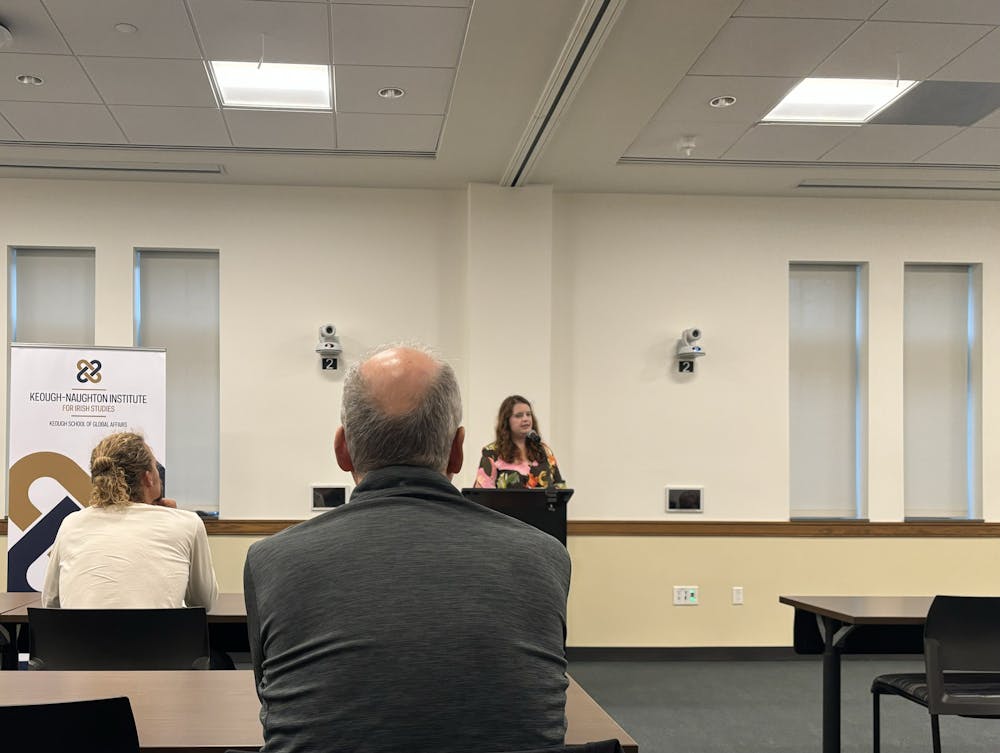On Tuesday evening the Keough-Naughton Institute hosted Emma DeSouza, founder and co-facilitator of The Civic Initiative, to give a lecture titled “From Partition to Partnership: The Future of Ireland’s Peace Process.”
As a campaigner, journalist and peace activist, DeSouza used her experiences in peace work to discuss Northern Ireland’s Good Friday Agreement (GFA).
DeSouza began her discussion on the current state of the peace process by outlining how interconnected Northern Ireland and the Republic of Ireland are.
“The island of Ireland has never been more connected and more integrated than any other period post partition than it is today,” DeSouza said.
DeSouza then went on to discuss the current challenges Northern Ireland continues to face in its peace process, despite being 26 years since the GFA. She described that the largest problem with the GFA is that it has never been fully implemented and the peace process is stagnant.
“What happens is, we make an agreement, we make commitments, and we don't deliver on them.” she said. “We then reward those commitments, put them in a new agreement and then the cycle just continues where it doesn't actually get implemented.”
DeSouza highlighted some most pressing issues Northern Ireland is facing as a result of the unfinished implementation of the GFA. Northern Ireland continues to experience religious segregation in housing and the education system as well as a high volume of young people leaving the area due to unfulfilled economic promises.
DeSouza explained why the departure of so many young people is especially concerning.
“Young people are often the drivers of change,” she said. “But there has not been enough done to equip the next generation of peace builders in Northern Ireland.”
DeSouza explained that another shortcoming of the GFA is persistent gender-based violence.
“Women are only mentioned twice in the Good Friday Agreement with no reference to gender based violence or the lived experiences of women conflict,” DeSouza said.
She opened her discussion on how to address the current injustices in North Ireland by noting that “positive peace is defined as a more lasting peace built on investment and economic developments as well as sustained institutions and attitudes that foster peace.”
She explained that a two-track approach of reform and implementation is needed to provide stability in Northern Ireland. DeSouza underscored the importance of reform and a change in attitude that improvement is possible.
“It’s been seen as this will do,” DeSouza said. “That's never the attitude you should have towards politics. You should always try and make it better.”
She stressed that civic engagement and a citizen’s ability to be part of policy change is a crucial aspect of reform. As part of the implementation process, DeSouza described that there needs to be a critical, independent analysis of implementation, then the development of an implementation strategy and finally an evaluation done by a third party monitor.
DeSouza went on to discuss public attitudes towards the border poll — a vote to either remain in the United Kingdom or create a united Ireland. She explained there is strong support for unification and polling has failed to show support for maintaining Northern Ireland’s position in the United Kingdom.
DeSouza expressed that more dialogue and an island-wide assembly are one the most critical aspects of preparation.
“We need to be much more ambitious about reaching people in their communities,” DeSouza said. “The national dialogue model is much better at achieving that.”
Ultimately, DeSouza advocated for the Irish government to push harder for a united Ireland, especially in the upcoming election.
“There has been a lack of concerted efforts from the Irish government to turn this aspiration into a political objective,” DeSouza said.
She concluded the lecture portion of the event by explaining the unfulfilled need for political leaders of the peace process.
DeSouza left the audience with the question: “who will have the political courage to step up and prepare for a peaceful transition to a new, United Ireland? We’ll wait to see.”










